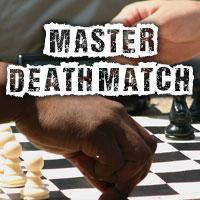
Polgar Wins Convincingly in Death Match 18
By virtue of winning all three segments, GM Judit Polgar cruised over GM Nigel Short in Chess.com's Death Match 18 on Saturday. The final margin was 17.5-10.5, with Polgar winning especially big in the three-minute segment (6-2).
The two played 28 games with only three draws. The fighting chess drew the largest online crowd for any Chess.com live broadcast ever - more than 2700 fans watched simultaneously at one point.

Polgar admitted before the match that she "is not playing very much on the Internet at all." She said she was prepared though, as the Chess.com server was not very different from other platforms that she has used. Despite playing Short dozens of times since the early 1990s, she had never played Short online before the Death Match.
The opening 5+1 portion did little to portend the final score as Polgar only edged Short 4-3. Despite falling behing on the clock in this and most other 5-minute games, Polgar won the initial game with methodical precision. According to live commentator GM Ben Finegold, that opening game was Polgar's best of the entire evening. The unusual placement of Black's light-squared bishop in the Ruy Lopez led to problems all game.
Short gamely fought back, winning games two and four to take his only lead of the match. The run would have been three in a row, but Polgar saved game three with good rook and pawn ending technique, and savvy pre-move usage. She was below five seconds for the final dozen moves, but the one-second increment allowed her to hold.
For the first hour and a half, Short relied almost exclusively on the English as White and Caro-Kann and French as Black.
Polgar then fought back with a typical Death Match streak that Short could never recover from. She went on to win six of the next seven games, a string only interrupted by a draw to end the 5-minute time control.

Polgar's run lapsed into the three-minute segment, where she began to get the upper-hand on the clock. The final win of the streak was puncutated with the most spectacular move of the day. After an exchange sac to weaken Black's dark squares, Short was simply unlucky on move 13.
The natural-looking zwischenzug 13...Nc2+ seemed winning, as if White moves the king, there will be no attack (better was actually to accept the rook and leave the queens on the board). But Polgar's shot 14. Qxc2 actually secured an advantage to her! Amazingly, Black cannot adequately defend after 15. Bb5. Best may be "hiding" the queen on b2, when it would have been interesting to see how brave Polgar was feeling. 16. Rxd5+ and returning to d7 would be a repetition, or she could then head to b7. Then, after slyly castling, Black would be under severe pressure.
Instead Short played 15...Ra5 instantaneously, which allowed Polgar to regain all of her material with interest.
Short recovered to win game 12 but the deficit had grown to five games by that point. Fatigue set in at the end of the three-minute segment - both players hung mate in one at the close, then Short missed mate in one in the second one-minute game.
Short did put together some mini-runs in the bullet, winning two games in a row early then three in a row later, but he never seriously challenged Polgar in the final standings. The only issue would be who would win that portion, and Polgar won both closing games to ensure that she got the best of all three disciplines.
The close of the match saw more creative opening choices. Polgar predicted the bullet would be the most exciting for fans, and she did her best to make this true.
Short essayed both the Evans Gambit and 2. h4 in response to the Modern Defense. "It would have been pretty dull if I had stuck with the same openings," he said.
Then both played the King's Gambit as White, something Polgar has not pulled out of her briefcase since early in her career. For Polgar, that was one of her only missteps of the match, as Short's Falkbeer CounterGambit proved to be a successful response. Polgar resigned on Short's move after seeing 26...Qa3 led to an undefendable mate threat.
After the match, Short said he was very disappointed with his own play. "I played absolutely disgustingly badly," he said. "I don't want to take anything away from Judit...My chess was just dreadful, absolutely woeful." He also explained that he had been in a minor car crash earlier in the day (in Athens, Greece, where he lives), resulting in a less-than-ideal mindset. "I'm not particularly fresh," he said.
"Blitz is a question of form and energy. I had neither the form nor energy...At some point I had more or less given up." He won $250 in the loss.
Polgar took $750 for the win. The Death Match finished too late in Budapest, Hungary for Polgar to celebrate with her two children, but she said her husband would share the victory with her.

Polgar said that blitz chess was a daily activity of hers when she was younger. "I had a lot of fun, and I don't get to play a lot of blitz these days, so I was hungry for doing so," she said after the match.
The next Death Match will be Saturday, November 2 at noon Eastern (U.S. time), 9 a.m. Pacific. GM David Smerdon will take on GM Simon Williams and Chess.com/tv will once again bring every move to viewers live with commentary.
Archives of this Death Match broadcast, with GM Ben Finegold and FM Mike Klein, will be available soon on Chess.com's video library.


